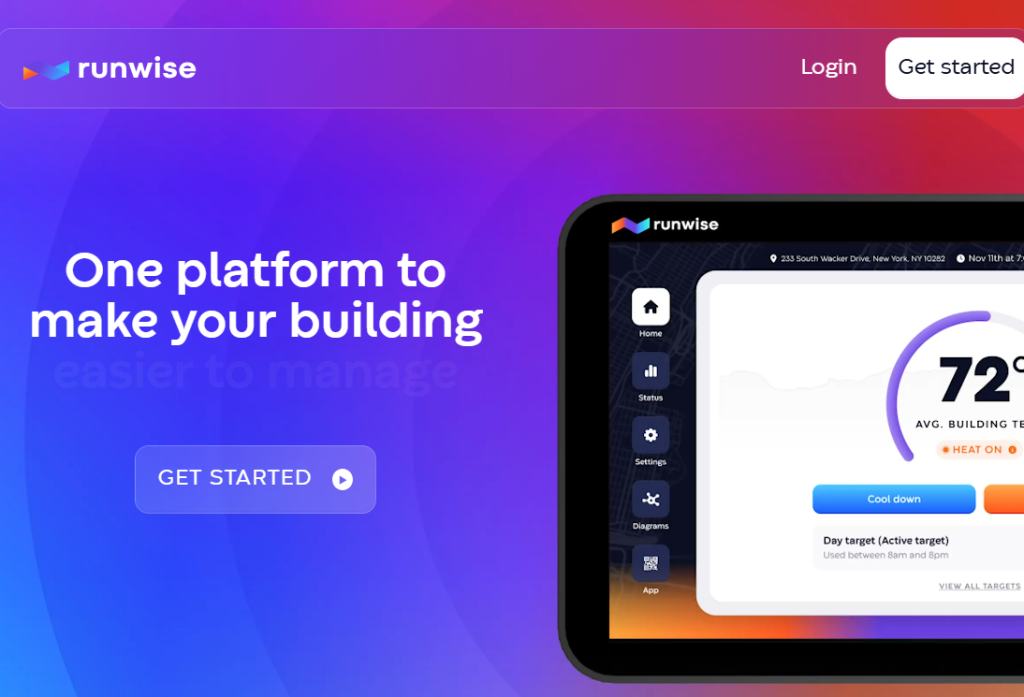Runwise Raises $55M to Modernize Building Operations with Smart Automation
July 7, 2025
byFenoms Start-Ups

Runwise, a startup revolutionizing energy management and automation for buildings, has raised $55 million in a Series B round to scale its intelligent control platform across the U.S. and beyond. The round was co-led by Menlo Ventures and MassMutual Ventures, with support from Nuveen Real Estate, Multiplier Capital, Munich Re Ventures, Soma Capital, Alumni Ventures, Fifth Wall, and Cooley.
Founded by Jeffrey Carleton, Lee Hoffman, and Michael Cook, Runwise offers a unified platform that uses machine learning, real-time monitoring, and predictive automation to make older buildings more efficient - cutting energy waste and unlocking operational intelligence without costly infrastructure overhauls.
What Runwise Does
Runwise’s platform enables building owners to cut energy costs and emissions by 20–30% - without ripping out old systems or installing expensive new infrastructure. Its core product is a smart, cloud-connected control system that uses real-time sensors, machine learning, and predictive algorithms to optimize fuel usage, especially during seasonal heating cycles.
The system includes:
- AI-powered boiler controls that auto-adjust based on tenant feedback, weather, and historical patterns
- Remote monitoring dashboards accessible via mobile and desktop
- Predictive maintenance and alerting for HVAC anomalies before failures occur
- Real-time compliance tools for carbon regulations and reporting
- Fast-install hardware that integrates into legacy systems without structural upgrades
Unlike conventional BMS systems that cost hundreds of thousands to deploy, Runwise installs in hours, not months, and often pays for itself in a single heating season.
Why It Matters Now
Globally, buildings account for 39% of carbon emissions (IEA, 2023). In cities like New York and Boston, heating systems alone are responsible for more than 30% of building energy use, yet most properties still run on analog boilers, oil burners, and manually adjusted valves.
More than 70% of large NYC buildings still burn fossil fuels inefficiently, and fines for carbon overages under Local Law 97 are expected to begin in 2025 - reaching up to $268 per ton of CO₂ emitted over threshold.
Replacing these systems is costly and time-consuming. But Runwise offers a retrofit-native alternative - one that brings measurable carbon savings and cost reductions without capital-intensive overhauls.
Where Founders Should Take Note
Founders building in infrastructure-heavy markets often fall into the trap of overbuilding before testing. Runwise offers a different lesson: build for ease of adoption first.
Their model didn’t start with sensors or complex hardware integrations. Instead, they focused on one unsexy but powerful constraint: legacy buildings. They optimized for install speed, compatibility with old systems, and measurable ROI in under 30 days. The result? Faster sales cycles, lower churn, and viral growth inside regional property manager networks.
Here’s the takeaway for other builders in climate or industrial tech: product excellence alone doesn’t scale infrastructure - frictionless deployment does. Don’t chase novelty. Chase surfaces where you can replace something painful with something automatic.
Market Outlook: PropTech Meets Climate Tech
Industry Outlook: PropTech in the Climate Age
The convergence of climate regulation, rising energy costs, and ESG mandates is creating a perfect storm for smart building adoption. And Runwise sits at the nexus of three megatrends:
- The PropTech Boom:
The global PropTech market is projected to reach $94.2 billion by 2032, growing at a CAGR of 16.8% (Precedence Research, 2024). - Climate Compliance Pressure:
Over 85 global cities have pledged net-zero building emissions by 2030 (C40 Cities). In NYC alone, Local Law 97 will affect over 50,000 buildings, creating a compliance tech boom worth billions. - Smart Building Demand:
The global smart building market is expected to hit $229 billion by 2030, fueled by retrofitting mandates and operational cost pressures (Fortune Business Insights, 2023). - Retrofit Over Rebuild:
80% of buildings standing in 2050 already exist today, making retrofitting the only scalable path to decarbonization (World Green Building Council).
Runwise is one of the few startups directly targeting the retrofit segment, which is both underserved and accelerating.
Why Runwise Is Winning
Runwise isn’t trying to replace every building’s system. It’s giving them a brain.
Their approach to modular, backwards-compatible automation removes adoption barriers. Features like cloud-based dashboards, mobile maintenance alerts, and AI-driven temperature balancing give operators data they never had before - without ripping out legacy infrastructure.
They’ve also quietly mastered distribution through vertical B2B sales - building deep relationships with property managers, superintendents, and portfolio managers, not just C-suites. This grassroots momentum has helped Runwise spread across over 6,000 buildings, covering more than 150 million square feet of real estate.
What’s Next for Runwise?
With this new $55 million in capital, Runwise plans to:
- Expand nationwide, entering new metro markets across the U.S. and Canada
- Invest in predictive AI models, improving real-time optimization and anomaly detection
- Add integrations for new equipment categories, including chillers, fans, and lighting
- Launch self-serve dashboards for small building owners and HOA-managed properties
- Hire across product, engineering, and client success to meet soaring customer demand
Their broader vision? To become the default operating system for building intelligence, regardless of whether a building is 5 or 50 years old.
Because in a world where regulation, efficiency, and sustainability collide, Runwise proves that smart retrofits are smarter business.









